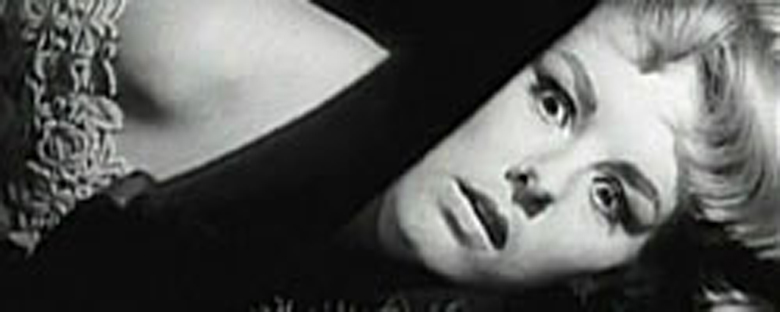Reviews
Francis Ford Coppola
USA, 1963
Credits
Review by Thomas Scalzo
Posted on 11 July 2004
Source Platinum Disc Corporation DVD
Related articles
Reviews: Caged Heat
Clocking in at a lean seventy-five minutes, Francis Ford Coppola’s 1963 horror flick Dementia 13 does not immediately recommend itself to comparisons with the grandiose epics (notably The Godfather and Apocalypse Now) that have come to define his career. Yet, in addition to being Coppola’s first feature film, Dementia ranks as one of his most interesting; a terse, barebones horror picture, which, in its best moments, emphasizes graphic and violent scenes of terror at a time when reliance on a malevolent ambiance and the macabre implication of fear were the genre norm.
Produced by the inimitable horror and b-movie icon Roger Corman, Dementia tells the story of the Haloran family, an ill-fated Irish clan that has never quite recovered from the untimely drowning death of Kathleen, their young daughter. Indeed, Lady Haloran, the insanely superstitious matriarch of the family, has devoted the pathetic remnants of her life to preserving her memory; Kathleen’s room has never been cleared out; her place setting at the family table has never been removed; and the poor girl’s funerary services are torturously reenacted year after year.
Mother Haloran has even gone so far as to exclude her sons, John, Richard, and Billy, from partaking in even the smallest parcel of her inheritance, decrying in her newly-altered will that every last penny go to charitable organizations in the name of the fallen Kathleen. With this latest indignity fresh in their respective minds, the three brothers have, once again, reunited at castle Haloran to accompany their besotted mother in paying respects to the dead. This year, however, John’s wife Louise, singularly incensed by her husband’s inheritance exclusion, has come along for the journey, intent on finding a way into her mother-in-law’s lucrative will.
With the idea of an inheritance squabble and possible fraternal jealousy at the heart of the film, it might appear at first glance that Dementia is little more than a stylish murder mystery, replete with a money-grubbing wife attempting to inculcate herself into the family fortune. But as the story progresses and the ominous stirrings of the castle grounds take on a more sinister manifestation, we realize that Coppola has a much darker tale to tell.
Admittedly, this dark tale borrows heavily from Hitchcock’s horror masterpiece, Psycho, incorporating as it does an eerily isolated setting, a presumptive leading lady being dispatched early on in the film, an explication-heavy ending, and a family-tragedy-fueled and psychotic (in this case demented) personality responsible for the murderous deeds. But even while clearly employing some of Hitchcock’s themes, Coppola crafts cinematic moments that are distinctive in their own right, showing that he is, in fact, learning from the master, not simply copying him.
In the film’s most enduringly gruesome scene, for example, the shadowy killer confronts an unsuspecting Louise as she attempts to climb out of the family pond. The horror of the extensive and frenzied axe attack that follows is superbly augmented by Coppola’s decision to include a lingering shot of Louise’s mangled corpse as it is slowly dragged away by the killer. Here we see an early example of a filmmaker dwelling on an act of unspeakable brutality in order to showcase violence for its own sake, allowing us to indulge our morbid fascination with death.
Unfortunately, with the passing of Louise, Coppola is forced to turn over the main character duties to the family doctor, a man who wants nothing but to uncover the killer: a motivation far less intriguing than the money-hungry-machinations of Louise. The end result of this shift is that, despite a few more chilling deaths, the bulk of the remaining story consists of the eternal fretting of Mother Haloran, the suspicious activities of the Haloran boys, and the efforts of the good doctor to collect clues and discover who is behind the evil deeds. And while this cleverly orchestrated mystery keeps us guessing until the doctor’s obligatory closing explanation, the intense element of pure terror, so vibrant earlier, is somewhat diluted.
Despite these minor complaints, however, Dementia 13 remains an important contribution to horror, and shows Coppola to be an unsung pioneer in the genre. The atmosphere is effectively foreboding, the murder sequences are resonating and grisly, and the ultimate inspiration for the killer’s dementia is satisfactorily explained. And while some might write off the film as a mere exercise of a young film student attempting to find his footing in a genre picture, Dementia 13 has endured as a thoroughly enjoyable horror film boasting a unsettling murder sequence as shocking today as it was over forty years ago.
We don’t do comments anymore, but you may contact us here or find us on Twitter or Facebook.



